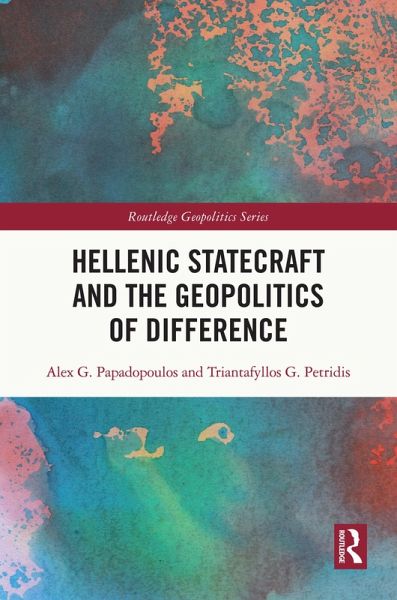
Hellenic Statecraft and the Geopolitics of Difference (eBook, PDF)
Versandkostenfrei!
Sofort per Download lieferbar
41,95 €
inkl. MwSt.
Weitere Ausgaben:

PAYBACK Punkte
21 °P sammeln!
This book explores competing definitions of Hellenism in the making of the Greek state by drawing on critical historical and geopolitical perspectives and their intersection with difference and exclusion.It examines Greece's central role in shaping the state system, regional security, and nationalisms of the Balkans, the Black Sea, and the Eastern Mediterranean regions. Understanding the Greek State's social constitution helps learn about the past and present intentions and strategies as well as local, national, and European notions of security and identity. The book looks at the relation of s...
This book explores competing definitions of Hellenism in the making of the Greek state by drawing on critical historical and geopolitical perspectives and their intersection with difference and exclusion.
It examines Greece's central role in shaping the state system, regional security, and nationalisms of the Balkans, the Black Sea, and the Eastern Mediterranean regions. Understanding the Greek State's social constitution helps learn about the past and present intentions and strategies as well as local, national, and European notions of security and identity. The book looks at the relation of subaltern communities to state power and the state's ability and willingness to negotiate difference. It also explores how the State's identity politics shaped regional geopolitics in the past two centuries. Chapters present case studies that shed light on the Hellenization of Jewish Thessaloniki, the Treaty of Lausanne's making of Western Thrace's Muslim minority, the role and modes of settlement, urbanization, and 'bordering-as-statecraft' in Eastern Macedonia and Western Thrace, and the politics of erecting the Athens Mosque, the first officially-licensed mosque outside Western Thrace since Greek Independence.
With examples from fieldwork in Greek cities and borderlands, this book offers a wealth of primary research from geographers and historians on the modern history of Greek statehood. It will be of key interest to scholars of political geography, international relations, and European history.
It examines Greece's central role in shaping the state system, regional security, and nationalisms of the Balkans, the Black Sea, and the Eastern Mediterranean regions. Understanding the Greek State's social constitution helps learn about the past and present intentions and strategies as well as local, national, and European notions of security and identity. The book looks at the relation of subaltern communities to state power and the state's ability and willingness to negotiate difference. It also explores how the State's identity politics shaped regional geopolitics in the past two centuries. Chapters present case studies that shed light on the Hellenization of Jewish Thessaloniki, the Treaty of Lausanne's making of Western Thrace's Muslim minority, the role and modes of settlement, urbanization, and 'bordering-as-statecraft' in Eastern Macedonia and Western Thrace, and the politics of erecting the Athens Mosque, the first officially-licensed mosque outside Western Thrace since Greek Independence.
With examples from fieldwork in Greek cities and borderlands, this book offers a wealth of primary research from geographers and historians on the modern history of Greek statehood. It will be of key interest to scholars of political geography, international relations, and European history.
Dieser Download kann aus rechtlichen Gründen nur mit Rechnungsadresse in A, B, BG, CY, CZ, D, DK, EW, E, FIN, F, GR, HR, H, IRL, I, LT, L, LR, M, NL, PL, P, R, S, SLO, SK ausgeliefert werden.













